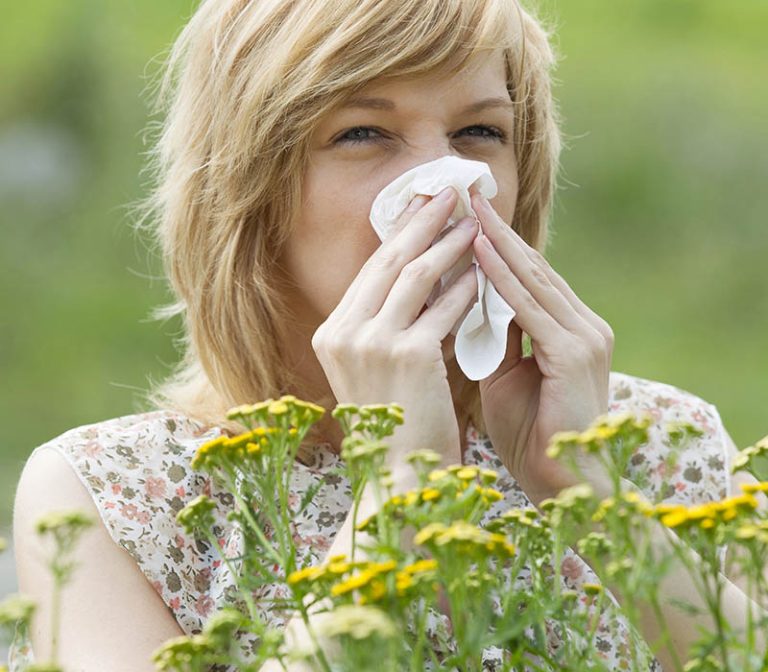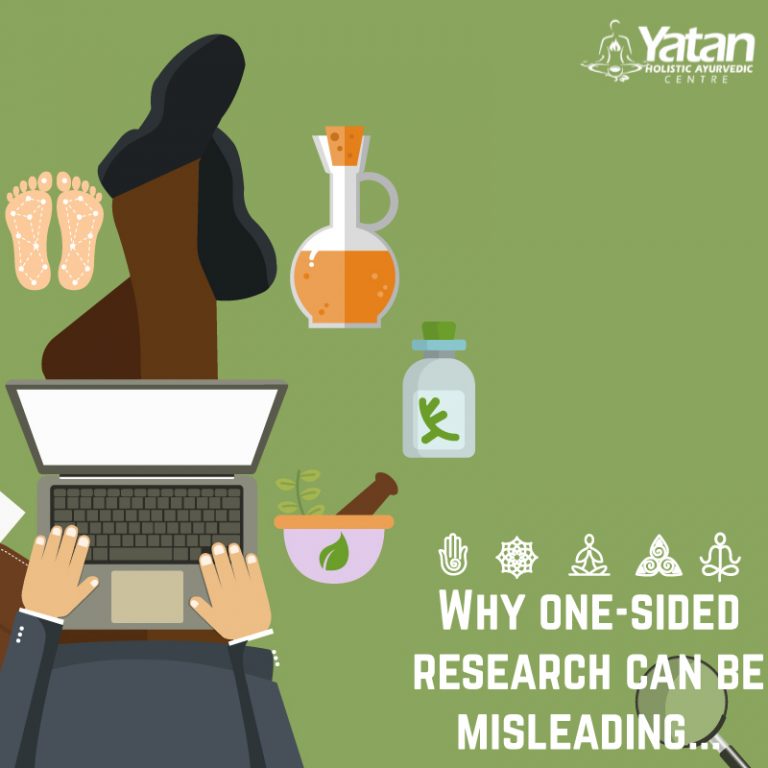Swollen Lymph Nodes: When Are They Serious and How Can Ayurveda Help?
Have you ever felt a pea-shaped swelling under your jaw, on your armpit, or around your groin area? If so, what you may have located is a swollen lymph node.
Also called lymph glands, lymph nodes are distributed all over the body and play a vital role in fighting infections and warding off pathogens. If an infection occurs, the lymph nodes will function as filters, trapping the pathogen (virus or bacteria) before it can infect other parts of your body.
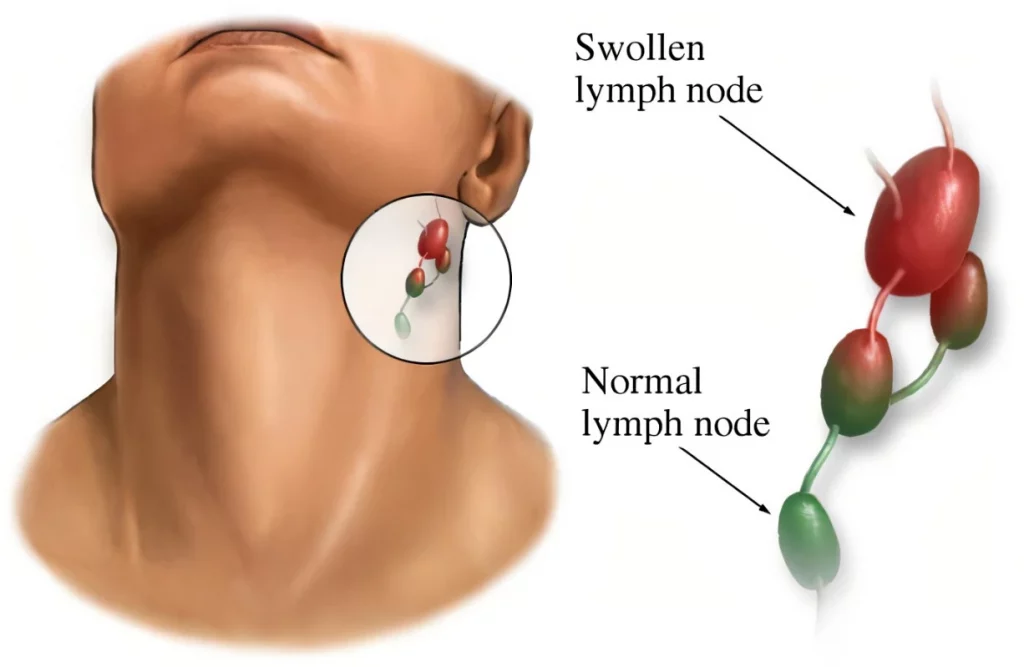
During this defensive function, lymph nodes may become temporarily enlarged. But severe or constant swelling may be due to a serious or even life-threatening cause.
So, what can you do if you notice a swollen or enlarged lymph node? When should you be concerned and what are your swollen lymph nodes treatment options? Before we get into these questions, let’s first take a look at how lymph nodes are formed and the Ayurvedic perspective on the matter.
Granthi: The Ayurvedic View on Swollen Lymph Nodes
Lymph nodes can be found all over the body. Known as granthi (knots) in Sanskrit, these small round clusters of cells are a part of the vast network known as the lymphatic system, which is responsible for draining wasteful fluid from within your body and maintaining immunity. Think of these small nodes as the first line of defense when it comes to beating an infection – an action that may lead to their swelling or enlargement.
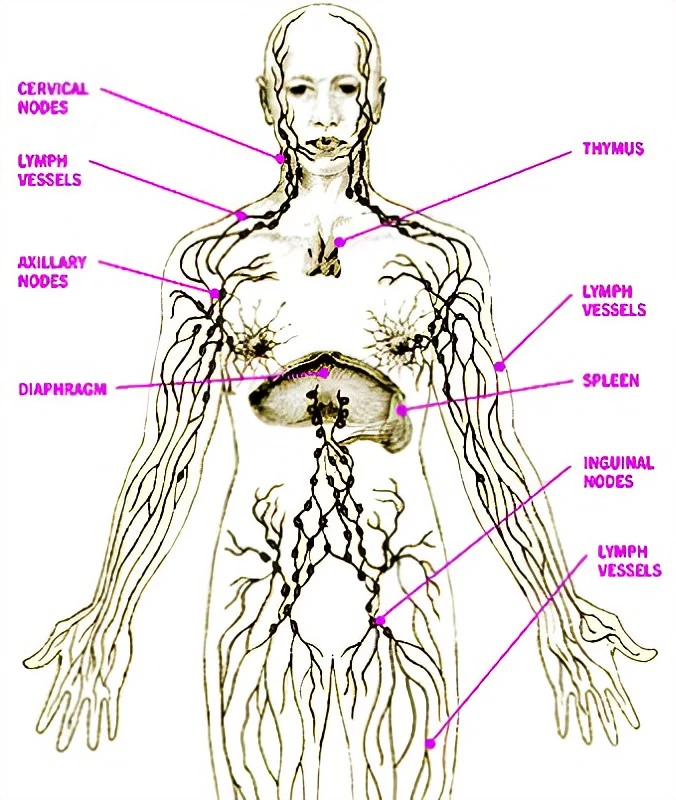
Swollen lymph nodes that are localised in a particular area indicate that something is wrong in that part of the body. For example, maybe you recently shaved your armpit, then found a swollen lymph node in that exact area; in this case, maybe your razor wasn’t clean, hence allowing bacteria to enter the pores of your armpit and result in a mild, local infection.
When there is a general swelling of lymph nodes throughout your body, it almost certainly signals a generalised infection that your system is trying to fight. This is often accompanied by swollen lymph nodes symptoms such as tenderness or other signs that are indicative of infection (runny nose, sore throat, fever, etc). Such an infection could be due to strep throat, mononucleosis, ear infection or other common acute ailments. But sometimes, it can be due to a more complicated immune system disorder, such as lupus or rheumatoid arthritis.
On rare occasions, swollen lymph nodes can be the result of cancer. This is usually the case when the swelling persists or when the lymph nodes harden and do not resume their normal size within a couple of weeks.
Ayurveda understands this “swelling of the knots” as an indication of Kapha aggravation, which translates to excessive retention of the water dosha in your body. This swelling or congestion is more commonly seen in women than men, particularly once over the age of 40. When this swelling occurs, the lymphatic system clogs up due to the lymph being thick and sticking to the cells, unable to flow and drain properly. This is why people with an aggravated Kapha dosha tend to have excessive mucus or are chronically congested, even asthmatic.
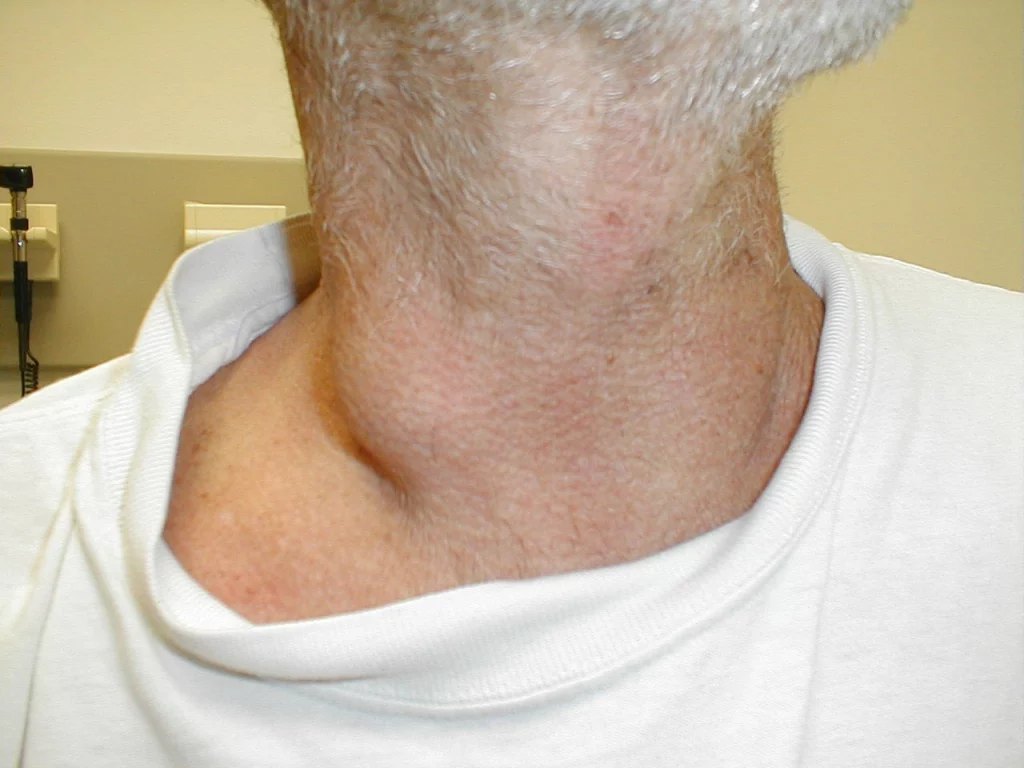
Ayurveda can, therefore, offer a different approach when it comes to treating swollen lymph nodes, with the cause of the Kapha aggravation being at the centre of the swollen lymph nodes treatment. This, however, does not mean that you should ignore any advice given to you by your own doctor.
When Should You Consult Your Doctor?
I will reveal how Ayurveda can help with swollen lymph nodes shortly, but I would first like to stress the importance of getting checked by your own physician if your lymph nodes persist.
You should consult your doctor if you have one or more of the following swollen lymph nodes symptoms:
- Prolonged infection or swelling
- Hardening of the lymph node(s)
- Severe swelling or enlargement of the lymph node(s)
- A fever that doesn’t subside
- Painful lymph nodes or surrounding areas that progressively become more painful
- Any symptoms that persist for two or more weeks
- Even if you are not experiencing the above symptoms, it is advised you at least get tested for any underlying illness, unless you are already aware of a chronic condition you have.
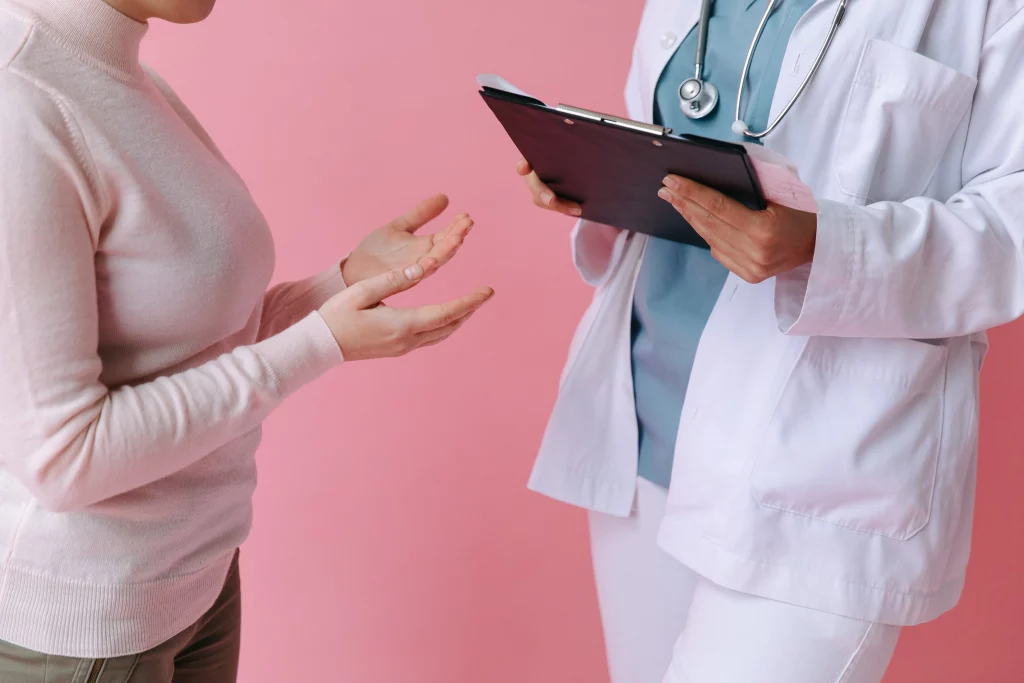
If you elect to work with an Ayurvedic practitioner, any test results, biopsy results, and diagnoses must be relayed to him so that the root cause of your lymph node swelling can be tackled directly. You should also disclose information about any medication you may be taking or any surgeries you have previously undergone.
But what kind of swollen lymph nodes treatment can you expect upon your visit to an Ayurvedic practitioner?
Ayurvedic Treatment for Swollen Lymph Nodes
Ayurvedic treatment will depend on where the swollen lymph nodes are and which organs may be affected. And there is also the root cause and personal dosha to consider.
Upon your visit to the Ayurvedic centre, a qualified Ayurvedic practitioner will initially ask you about your swollen nodes symptoms, medical history, and lifestyle. He may also read your pulse, eyes, and energy overall. All these preliminary questions are intended as a means of identifying your dosha and assessing any dosha imbalances and other problems within the body. The practitioner will then present you with one or more of the following treatment options:
- Panchakarma

Panchakarma is a deeply cleansing and purifying experience targeted at detoxifying the organs and rejuvenating the entire body. In the case of swollen lymph nodes, such a Panchakarma session would aim at liver detoxification, as this organ produces a large amount of lymph fluid (this is known as the hepatic lymphatic system). Naturally, not all Panchakarma sessions are the same, and such a session would be personalised to your needs, tolerances, and the severity of your condition. Panchkarma may be effective for swollen lymph nodes treatment.
- Liver Detox Diet
A customised dietary plan may be given to you in order to further detoxify your liver and other organs while balancing out the Kapha dosha. You would most likely be requested to cut out all red meat and eat leaner meats instead, like fish and chicken. Other food recommendations may include avoiding dairy (as it elevates Kapha) while incorporating more spices into your diets (which decrease Kapha) such as ginger, black pepper, and such. An alkaline, pH-regulating diet may be prescribed if you are dealing with elevated acidity within the body.
- Ayurvedic Herbal Medicine
A customised herbal remedy may be decocted for you by your Ayurvedic practitioner. The most commonly used Ayurvedic herbs for lymphatic support are Manjistha, Ashwagandha, and Turmeric but you should never attempt to self-medicate; instead, always consult an Ayurvedic practitioner for the safest and most suitable dosage options.
- Yoga
Yoga is more than just a way to stay fit (which is still highly advised for those with excess Kapha); it can also be prescribed as a complementary form of therapy. When it comes to Kapha aggravation and lymphatic congestion, the most recommended poses are Indian pushups, Sun Salutations, Forward Bends (both Standing and Seated), Fish pose, and Cobra poses.
Conclusion
Getting to the bottom of swollen lymph nodes is key to understanding the severity of your problem and seeking prompt treatment. If you’re a woman over the age of 40, you are more prone to developing an excess in Kapha, which can lead to severe lymphatic swelling, congestion, and related diseases.
At the Yatan Holistic Ayurvedic Centre in Sydney, we can assist you by tailoring your own customised lymphatic detox treatment plan, which is free of side effects and 100% natural. Do not delay in addressing any kind of visible swelling, as the end result may be detrimental to your health and well-being.
Frequently Asked Questions
How long does it take for swollen lymph nodes to go away?
The duration for swollen lymph nodes to resolve varies depending on the cause. In many cases, they may go away within a few days to two weeks once the underlying issue is treated or the body fights off the infection.
Can a swollen lymph node go away on its own?
Yes, in some cases, swollen lymph nodes can resolve on their own without medical intervention. If the enlargement is due to a minor infection, the body’s immune system can usually handle it. However, if they persist for over three weeks, you should immediately consult a doctor.
How serious is a swollen lymph node?
The seriousness of a swollen lymph node depends on the underlying cause. In most cases, it’s a normal response to an infection or inflammation caused by a bacteria or a virus. However, persistent or excessively swollen lymph nodes should be evaluated by a healthcare provider, as they could indicate more serious conditions.
Should you massage swollen lymph nodes?
In some cases, gentle massage techniques may help with lymphatic drainage, but improper handling can worsen the condition or cause irritation in the existing swollen lymph nodes.
What if my lymph nodes are swollen but not sick?
Swollen lymph nodes can occur for various reasons, not just due to an active illness. They may enlarge in response to recent infections, vaccinations, or even due to certain medications. However, if you’re concerned about persistent or severe swelling, it’s essential to consult a healthcare provider for evaluation.
Can lymph nodes swell from stress?
Yes, stress and anxiety may contribute to the swelling of lymph nodes. Stress can weaken the immune system, making the body more susceptible to infections and inflammation, which can, in turn, lead to lymph node enlargement.
What happens if you leave swollen lymph nodes untreated?
If swollen lymph nodes are left untreated, they may persist or worsen, and the underlying cause may go undiagnosed.
What does an infected lymph node feel like?
An infected lymph node may feel like a round bump which is tender and warm. The node’s size might increase as it fills with white blood cells fighting the infection.
Does COVID swell lymph nodes?
Swollen lymph nodes could be a possible symptom of COVID-19 or its vaccination, particularly in the neck and armpit areas. However, they may also be caused by other infections or immune responses.
Do lymph nodes swell without infection?
Yes, lymph nodes can swell in response to non-infectious causes such as inflammation, allergic reactions, and cancer. If swollen nodes persist without a clear cause, medical evaluation is recommended.
How do you know if your lymph nodes are okay?
Generally, small, soft, and painless lymph nodes that are not rapidly growing or changing are considered normal. If you notice persistent enlargement, tenderness, or other concerning symptoms, consult a healthcare professional for evaluation.
Do cancerous lymph nodes hurt?
Cancerous lymph nodes can be painless or painful, depending on the specific type and stage of cancer. They may be accompanied by other symptoms like unexplained weight loss, fatigue, or night sweats.
What do cancerous swollen lymph nodes feel like?
Cancerous lymph nodes may feel firm, rubbery, or hard to the touch. They can be fixed in place and not easily movable. However, it’s essential to remember that not all swollen lymph nodes indicate cancer.
Can swollen lymph nodes make you tired?
Swollen lymph nodes themselves may not directly cause fatigue, but the underlying condition leading to their enlargement, such as an infection or autoimmune disease, might result in fatigue as the body fights off the illness.
Are you dealing with swollen lymph nodes or overall lymphatic congestion? Contact us today for a phone consultation or book an appointment online.
Disclaimer: This article is not intended to substitute medical advice. All information and resources referenced, including medicinal preparations, fitness, dietary and lifestyle recommendations, are based on the opinion of the author. Please consult a medical practitioner if you require advice or are experiencing any worrisome symptoms.

*Discover holistic healing with a complimentary phone or video consultation from our expert Ayurvedic practitioner. Start your path to better health today!*





















